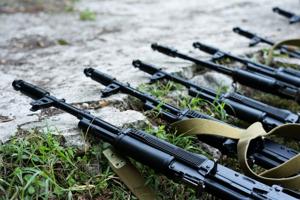(The Center Square) – The U.S. Supreme Court has denied a request for an emergency injunction against Illinois’ gun ban as plaintiffs anticipate the court to eventually take the case on appeal.
Plaintiffs in the challenge out of Naperville against the state’s gun ban asked U.S. Supreme Court Justice Amy Coney Barrett to issue an emergency injunction against the law while the case plays out on the merits. After getting briefs from both plaintiffs and defendants, Barret Thursday referred the case to the court which then denied the motion for an injunction.
Hannah Hill with the National Association for Gun Rights posted on social media she looks forward to the U.S. Supreme Court having the opportunity to weigh in on the merits of the case challenging the constitutionality of banning commonly owned firearms.
“The Supreme Court denied our emergency appeal – hopefully because they are waiting for our official cert petition,” Hill posted on X, formerly Twitter. “The Court has taken serious notice of this case twice, & we look forward to giving them the opportunity to weigh in on the merits.”
Gun control advocates G-PAC issued a statement after the emergency injunction was denied, saying gun rights groups “continue to get nowhere.”
“No amount of flailing around by losing lawyers alters the basic fact that sale in Illinois of these destructive weapons continues to be blocked completely,” said G-PAC executive board member John Schmidt.
Before the U.S. Supreme Court docket was updated Thursday, Gov. J.B. Pritzker said he expects the Jan. 1 gun ban registration deadline to go into effect.
“This is not only a legal undertaking, an appropriate undertaking, to keep and safeguard the people of the state of Illinois, but a constitutional one too,” Pritzker said.
With the gun ban registry rules not yet finalized by the Joint Committee on Administrative Rules, and the merits of whether the law is constitutional not fully hashed out, Pritzker said people know what they need to register.
“And nobody is getting charged, arrested, as you know, the first commission of a violation is a misdemeanor if it even gets charged,” Pritzker said. “The second violation is a felony.”
The governor also explained his reason for requiring a registry.
“Because what you want to do is prevent people from purchasing assault weapons in the state and you want to make sure that you know where those very deadly weapons are, who owns them, when and where a crime is committed with one,” Pritzker said.
Separately, a ruling on a preliminary injunction against the deadline is still pending in district court after oral arguments earlier this week. Southern District of Illinois federal Judge Stephen McGlynn said he will file a ruling promptly and is inclined to not block the deadline, insisting the litigants tackle the merits of the case sooner than later.







